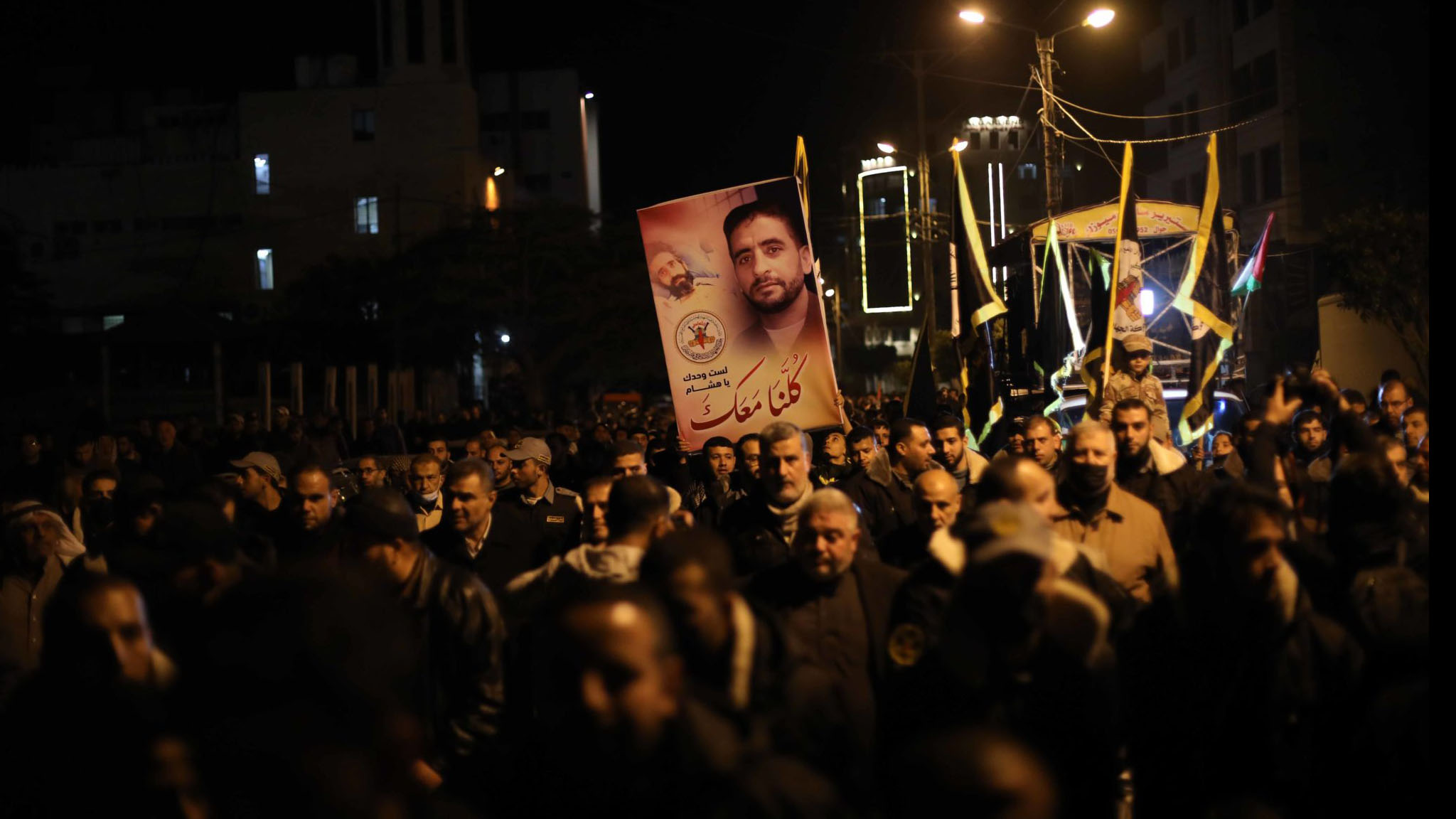Palestinian detainee Hisham Abu Hawwash has ended his hunger strike after Israeli authorities confirmed that his administrative detention order will not be renewed and that he will be definitively released in February. Abu Hawwash had been on a hunger strike for the last 141 days to protest his illegal administrative detention by Israel, and to demand his full release. The news was celebrated by Palestinians who had participated in demonstrations and solidarity rallies on Monday, January 3, in solidarity with Hisham Abu Hawwash, and have been agitating for his release for months alongside the larger struggle for the release of all administrative detainees.
Palestinians celebrate hunger striker Hisham Abu Hawash’s victory after news broke that he will be released from prison 🇵🇸🎇 pic.twitter.com/Tv6BMoRqYM
— IMEU (@theIMEU) January 4, 2022
Under administrative detention, Israel can illegally detain Palestinians for indefinite periods of time without charge or trial, based on secret evidence. Authorities are able to renew the administrative detention orders every 4 to 6 months. There are estimated to be 550 Palestinians held in administrative detention in Israel, from a total of more than 4,600 Palestinian prisoners.
Last week, instead of cancelling the administrative detention order against Hawwash, Israeli prison authorities decided to issue a freeze against it, effectively putting him in limbo regarding his release and also leaving open the option to renew or extend his detention at any time. Hawwash who had already passed 135 days without any food or water, decided to continue his hunger strike, despite a range of severe health complications and physical deterioration resulting in transferal to a hospital.
Hawwash has developed a wide range of serious and debilitating health issues during the course of his hunger strike, such as loss of vision, hearing, speech, serious weight loss, constant fatigue, pain, dizziness, migraine, chest palpitations, blood poisoning and muscle atrophy. He was also facing irreversible risk of damage to his kidneys, liver and heart. Hawwash began his hunger strike on August 17, 2021. He launched his strike after completing two six-month administrative detention orders and after the issuance of yet another detention order against him, which later was reduced from six to four months.
Mounting pressure
On January 3, rallies were held in Ramallah and Bethlehem, in Hawwash’s native village of Dura, in Jerusalem in front of the Assaf Harofeh hospital where he is currently being held as he undergoes treatment, as well as in the Palestinian-majority city of Umm Al-Fahm, where Israeli security forces violently suppressed the demonstration and physically assaulted and arrested demonstrators. Several other cities and towns in both the West Bank and Israel also witnessed rallies in solidarity with Hawwash. Solidarity rallies and vigils were organized by thousands of students at the Birzeit university in Ramallah and in besieged Gaza, where the participants raised slogans, chanted Hawwash’s name and held up posters and placards which read “We are all with you” and “You are not alone Hashim”, demanding his immediate and unconditional release as well as that of the other administrative detainees in Israeli prisons.
Over the weekend, prisoners’ rights and medical charities reiterated their concerns regarding Hawwash’s health and the immense risk of death he is facing due to his extremely serious physical condition. As the International Committee of the Red Cross (ICRC) tweeted on Sunday: “the ICRC continues to visit Mr. Hisham Ismail Ahmad Abu Hawwash and is gravely concerned about his deteriorating health. From a medical perspective, after 138 days of hunger strike, he is in critical condition requiring expert clinical monitoring. Every effort must be made to find a solution to avoid irreversible health consequences and possible tragic loss of life… Every detainee must be treated humanely and with dignity.”
The ICRC continues to visit Mr. Hisham Ismail Ahmad Abu Hawash and is gravely concerned about his deteriorating health.
Every effort must be made to find a solution to avoid irreversible health consequences and possible tragic loss of life. pic.twitter.com/YbnDqpbBxF— ICRC in Israel & OT (@ICRC_ilot) January 1, 2022
The Palestinian Commission of Detainees’ and ex-Detainees’ Affairs also revealed on Monday that Hawwash had fallen into a coma and that his health was deteriorating very rapidly, adding that he faces a very high risk of sudden death. According to Qadri Abu Baker, the head of the Detainees’ Affairs Committee, Hawwash was almost on the verge of ‘clinical death’.
As Abu Baker articulated on Sunday, strong efforts were being made to secure Hawwash’s release in order to save his life, adding that both Egypt and Qatar sent mediators to Israel, in hopes of convincing the Israeli government to end Hawwash’s administrative detention. Additionally, the Palestinian Authority’s (PA) foreign ministry, as well as PA prime minister Mohammad Shtayyeh urged the international community to put pressure on Israel to free Hawwash. The PA ministry said that it has reached out to all relevant international and UN institutions in this regard and was making all efforts to secure Hawwash’s release and save his life.
With Abu Hawwash’s release, the struggle against administrative detention continues. On January 4, 500 Palestinians in administrative detention launched a boycott of Israel’s military courts, refusing to participate in “barbaric, racist tool that has consumed hundreds of years from the lives of our people under the banner of administrative detention”.





